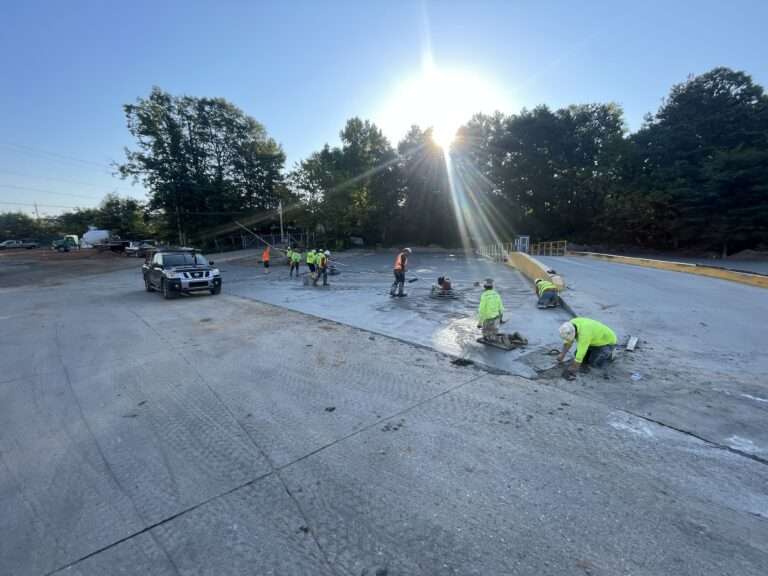Navigating building codes and regulations presents significant challenges for commercial construction projects in Georgia. First of all, it’s not easy to keep up with frequent updates and amendments, such as the 2024 changes to the International Building Code (IBC). Many companies struggle to stay current, leading to unintentional non-compliance, project delays, increased costs, or even legal penalties. The complexity of the codes, which cover everything from electrical systems to energy efficiency and hazardous materials, requires a deep level of expertise. Companies often get it wrong by not fully understanding specific requirements or underestimating the importance of detailed planning and thorough inspections.
We’re Here To Help! Commercial Concrete Contractors Near Me
At Atlanta Concrete Contractors, we help you navigate these complexities effectively. With over 20 years of industry experience, we are a veteran-owned and operated company offering a wealth of knowledge and expertise in complying with Georgia’s building codes and regulations. Our team of skilled professionals ensures that all aspects of your project meet the necessary standards from the start. We provide comprehensive concrete services, including flatwork, footings, poured concrete walls, parking lots, slabs, and foundations, all while adhering to the latest building codes. Our commitment to high-quality work and excellent customer service helps make your construction project as stress-free as possible, ensuring timely completion within budget and full compliance with all regulatory requirements.
Here is all you need to know about building codes and regulations in Georgia:
The International Building Code (IBC)
The IBC is a comprehensive set of regulations developed by the International Code Council (ICC) to ensure the safety, health, and welfare of the public in building construction. The IBC sets forth the standards for the design, construction, alteration, and maintenance of buildings and structures, including regulations on fire safety, structural integrity, plumbing, electrical systems, and energy efficiency. The IBC is widely adopted across the United States and internationally, serving as a model code that local jurisdictions can adapt and enforce. It is updated every three years to incorporate the latest advancements in building technology and construction practices, as well as to address new safety concerns and lessons learned from recent building failures or disasters. By adhering to the IBC, builders and developers can ensure that their projects meet the minimum safety standards required by law, thereby protecting occupants and reducing the risk of accidents and structural failures.
Overview of Georgia State Amendments to the IBC
The 2018 edition of the IBC, when combined with Georgia’s state-specific amendments, forms the official Georgia State Minimum Standard Building Code.
Key amendments you should be aware of include:
- Electrical and Energy Codes
Georgia has replaced all references to the ICC Electrical Code and the International Energy Conservation Code (IECC) with its own State Minimum Standard Electrical Code and State Minimum Standard Energy Code. These state-specific codes include unique supplements and amendments tailored to address Georgia’s climate, energy needs, and safety concerns. For example, the State Minimum Standard Energy Code emphasizes energy efficiency measures suited to Georgia’s hot and humid climate, such as enhanced insulation requirements and high-efficiency HVAC systems. These regulations aim to reduce energy consumption and improve building performance, ultimately leading to lower operational costs for commercial buildings.
For example, a commercial building project in Atlanta must comply with the State Minimum Standard Energy Code by incorporating high-performance windows with low U-values to minimize heat gain. Additionally, lighting systems must be designed with automatic controls to reduce energy use during non-occupancy periods, which directly addresses Georgia’s energy conservation goals.
- The International Existing Building Code (IEBC)
The IEBC is optional in Georgia and is applicable only if specifically referenced in local ordinances. Instead, Chapter 34 of Georgia’s amendments governs the standards for existing buildings. This chapter provides guidelines for renovation, alteration, and refurbishment projects, ensuring that they meet current safety and performance standards without the need for complete reconstruction. This flexibility is crucial for maintaining the integrity of older buildings while updating them to comply with modern codes.
For example, a historic office building in downtown Atlanta undergoing renovation must adhere to Chapter 34 of Georgia’s amendments. This may involve upgrading the electrical systems to meet current safety standards, improving structural components to withstand seismic activity, and ensuring accessibility features are up to date, all without altering the building’s historic character.
- Scope of Application
The amended codes in Georgia apply broadly to various construction activities, including the construction, alteration, relocation, enlargement, replacement, repair, equipment, use and occupancy, location, maintenance, removal, and demolition of buildings and structures. However, there are exceptions for specific types of buildings, such as detached one- and two-family dwellings, which follow the International Residential Code with state amendments.
For example, a commercial property developer planning to expand a retail complex in Atlanta must consider the full scope of the Georgia State Minimum Standard Building Code. This includes ensuring that the new construction and any modifications to existing structures comply with fire safety regulations, accessibility requirements, and energy efficiency standards, thereby ensuring a safe and compliant environment for both occupants and visitors.
Common Pitfalls When it Comes to Codes and Regulations
Improper handling of zoning laws and permits, coupled with the complexity and frequent updates of building codes, presents significant challenges for construction projects in Atlanta. Navigating state regulations, local amendments, and enforcement practices can be daunting, and failure to comply can halt projects or lead to costly modifications. Companies sometimes cut corners or inadequately engage with local authorities, resulting in non-compliance. Addressing these challenges requires continuous education, expert consultations, and staying updated with code changes. Working with experienced professionals like Atlanta Concrete Contractors ensures projects are completed on time, within budget, and in full compliance with all required standards.
Improper Handling of Zoning Laws and Permits
One common issue in commercial construction is mishandling zoning laws and permits. In Atlanta, navigating state regulations and local amendments can be complex. This regulatory maze can be overwhelming, and failing to comply with local requirements often halts projects or necessitates costly changes. Companies sometimes try to cut corners or don’t engage adequately with local authorities, leading to avoidable non-compliance. These problems highlight the need for experienced professionals, like Atlanta Concrete Contractors, who can expertly navigate these regulations, ensuring projects are completed on time, within budget, and in full compliance with all required standards.
Addressing Compliance Challenges
Ensuring compliance with building codes can be particularly challenging due to the intricate nature of the regulations and their frequent updates. Common difficulties include fully understanding specific requirements, staying current with changes, and guaranteeing that all project aspects meet the necessary standards. Overcoming these obstacles requires ongoing education, expert consultation, and utilizing technology to remain informed about code changes. Achieving proper compliance not only ensures safety but also streamlines the construction process and helps prevent costly rework.
Key Tips to Stay Compliant
To ensure compliance with building codes in Georgia, stay informed about updates from the Georgia Department of Community Affairs and other relevant authorities. Engage experienced professionals like architects and engineers who understand these codes to guide your project. Develop a detailed plan that includes inspections, permits, and compliance checks to avoid costly revisions and delays. Lastly, consult local building authorities early to clarify any ambiguities and confirm applicable codes, ensuring your project meets all local requirements and avoids compliance issues.
- Stay Informed
Staying informed about the latest updates to building codes and regulations is crucial for compliance. Regularly reviewing updates from the Georgia Department of Community Affairs and other relevant authorities ensures that you are aware of any changes or new requirements that may affect your project. This involves subscribing to newsletters, attending seminars, and participating in training sessions offered by regulatory bodies. Keeping up-to-date with the specific amendments relevant to your project can prevent costly mistakes and ensure that your construction practices are always in line with the latest standards. For example, understanding the latest energy efficiency requirements can help you plan more sustainable building designs that comply with the State Minimum Standard Energy Code.
- Detailed Planning
Developing a comprehensive plan that includes all necessary inspections, permits, and compliance checks is a proactive approach that can prevent costly revisions and delays. This plan should outline every step of the construction process, from initial design to final inspection, ensuring that each phase complies with relevant codes and regulations. Detailed planning involves scheduling regular inspections to identify and address potential compliance issues early, securing all required permits before construction begins, and maintaining thorough documentation of compliance efforts. This meticulous approach helps ensure that your project progresses smoothly and adheres to all regulatory requirements, reducing the risk of delays and additional costs.
A detailed construction plan for a new commercial building in Atlanta might include specific timelines for obtaining electrical permits, scheduling energy efficiency inspections, and conducting structural assessments at various stages of the project. By incorporating these compliance checks into your project timeline, you can address any issues promptly and keep the project on track.
- Consult Local Authorities
Engaging with local building authorities early in the project is essential for clarifying any ambiguities and confirming which optional codes and appendices are enforced in your jurisdiction. Local authorities can provide guidance on specific code interpretations, offer insights into common compliance issues, and help you understand the enforcement process. By consulting with these authorities, you can ensure that your project meets all local requirements and avoid potential compliance pitfalls.
For example, before beginning construction on a commercial property in Cobb County, a developer might schedule a meeting with local zoning officials to discuss the project’s scope, confirm applicable codes, and address any potential zoning issues. This early consultation helps ensure that the project complies with all local regulations and proceeds without unexpected legal or regulatory challenges.
- Working with Experienced Professionals: Atlanta Concrete Contractors
Engaging experienced professionals is crucial for ensuring compliance with building codes from the outset. At Atlanta Concrete Contractors, our team has extensive knowledge of Georgia’s building codes, providing valuable insights to ensure that all aspects of your project meet the necessary standards. Our expertise helps navigate complex regulations, accurately interpret code requirements, and implement best practices in construction. By working with skilled professionals like us, you can confidently address the stringent requirements of various building codes, ensuring your project is both compliant and cost-effective. This level of proficiency is essential for achieving a successful, compliant construction project.
Concrete Services in Compliance: So You Can Rest Assured
Successfully navigating building codes and regulations for commercial projects in Georgia requires a thorough understanding of both the International Building Code (IBC) and the specific state amendments. By staying informed and collaborating with knowledgeable professionals, you can ensure your project complies with all necessary standards, paving the way for a smooth and efficient construction process. At Atlanta Concrete Contractors, we are well-equipped to help you navigate these regulations and achieve successful project outcomes. With our veteran-owned and operated status, extensive experience, and commitment to quality, we are the perfect partner for your next construction project.
Contact us today to book your next service and ensure your project is in the best hands.
Sources
- Fleming Construction Group: Building Codes – What Are They and How Do They Impact Your Large-Scale Construction Project
https://www.flemingconstructiongroup.com/building-codes-what-are-they-and-how-do-they-impact-your-large-scale-construction-project/ - Atlanta Department of City Planning: Learn About Zoning & Building Codes
https://www.atlantaga.gov/government/departments/city-planning/zoning-development-permitting-services/getting-started-with-our-zd-p-services/learn-about-zoning-building-codes - Georgia Department of Community Affairs: Construction Codes
https://www.dca.ga.gov/local-government-assistance/construction-codes-industrialized-buildings/construction-codes - RTF Construction: Breaking Down the Costs – Understanding Commercial Property Construction in Atlanta
https://rtfconstruction.com/breaking-down-the-costs-understanding-commercial-property-construction-in-atlanta/ - NIST Technical Note 998
https://nvlpubs.nist.gov/nistpubs/Legacy/TN/nbstechnicalnote998.pdf - Lumberfi Blog: Understanding and Overcoming Common Challenges in Building Code Compliance
https://www.lumberfi.com/blog/understanding-and-overcoming-common-challenges-in-building-code-compliance - Governing: Buildings Are Central to Atlanta’s Climate Fight
https://www.governing.com/community/buildings-are-central-to-atlantas-climate-fight-heres-why - Atlanta Concrete Contractors
https://atlantaconcretecontractors.com/



